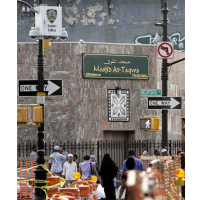Muslim Surveillance Lawsuits Settle with No NYPD Admission of Wrongdoing or Damages Paid, Just a Promise to Stop Spying
 NYPD surveillance camera, upper left, keeps watch on Muslim community outside of Brooklyn mosque (photo: Bebeto Matthews, AP)
NYPD surveillance camera, upper left, keeps watch on Muslim community outside of Brooklyn mosque (photo: Bebeto Matthews, AP)
By Tom Hays, Associated Press
NEW YORK (AP) — The New York Police Department will tighten safeguards against illegal surveillance of Muslims in secret investigations of terror threats and install a civilian representative on an advisory committee that reviews the probes under the terms of a settlement of two high-profile civil rights lawsuits, lawyers said Thursday.
The announcement of a deal came after months of negotiations aimed at formally ending litigation over accusations that the nation's largest police department had cast a shadow over Muslim communities with a covert campaign of religious profiling and illegal spying.
"We are committed to strengthening the relationship between our administration and communities of faith so that residents of every background feel respected and protected," Mayor Bill de Blasio said in a statement.
The suits were among legal actions that followed reports by The Associated Press that revealed how city police infiltrated Muslim student groups, put informants in mosques and otherwise spied on Muslims as part of a broad effort to prevent terrorist attacks.
The NYPD didn't admit any wrongdoing, and the city won't pay any damages other than about $1.6 million for the plaintiff's legal fees. The department instead agreed to codify civil rights and other protections required under the court-ordered Handschu decree, which was put in place in response to surveillance used against war protesters in the 1960s and '70s. The decree was relaxed after the Sept. 11 terror attacks to allow police to more freely monitor political activity in public places.
Civil rights groups sued in 2013 in federal court in Manhattan, accusing the NYPD of breaking Handschu rules. A second suit filed that year in Brooklyn federal court by mosques, a charity and community leaders alleged that the department was discriminating against Muslims.
Among the plaintiffs in the Brooklyn case was Hamid Hassan Raza, an imam who claimed the NYPD's practice of cultivating informants and using undercover investigators had spread fear and suspicion at his mosque. He called the deal important "not only for New York Muslim communities but for other minorities in New York and beyond."
The city began settlement talks last year, and a tentative deal in the Brooklyn case was reached in June. The final agreement "will curtail practices that wrongly stigmatize individuals" while making investigations "more effective by focusing on criminal behavior," said Arthur Eisenberg, legal director for the New York Civil Liberties Union.
Under the deal, the Handschu guidelines will specifically ban investigations based on race, religion or ethnicity. Other provisions require the department to use the least intrusive investigative techniques possible and to consider "the potential effect on the political or religious activity of individuals, groups or organizations and the potential effect on persons who, although not a target of the investigation are affected by or subject to the technique."
The settlement also sets time limits for ending investigations that ultimately fail to turn up threats — 18 months for preliminary investigations, three years for full investigations and five years for terror conspiracy cases. The civilian representative, appointed by the mayor, will attend monthly meetings of police officials and NYPD lawyers who review the investigations and will have authority to report any suspected violations of the agreement to City Hall or a federal judge.
Police officials insisted the agreement, while requiring more specific guidelines and greater accountability, mostly formalizes guidelines that were already in place. The head of NYPD's intelligence and counterterrorism operations, John Miller, will still make the final call on when and how to investigate terror threats, they said.
"There's an additional layer of oversight that we don't object to," Miller said. "I don't think anyone loses here. New York will be as safe on Friday as it was on Thursday because we haven't lost any of our powers to launch investigations."
Another provision requires the NYPD to remove from a department website a 2007 report warning of a "radicalization" process that puts young Middle Eastern immigrants on a path to commit acts of homegrown terrorism. Muslim groups had called the findings faulty and inflammatory.
"This settlement is important in light of escalating anti-Muslim rhetoric and hate crimes in the U.S., but at the same time we hope Mayor de Blasio will be more vocal about why the department was simply wrong to engage in religious profiling of the Muslim community in the first place," the Center for Constitutional Rights said in a statement.
The settlement has no bearing on a pending lawsuit in New Jersey accusing the NYPD of using a special unit to monitor Muslim groups there without suspicion of criminal activity. The department announced last year that it was disbanding the unit.
Associated Press Writer Colleen Long contributed to this report.
To Learn More:
Judge Throws Out Lawsuit against NYPD for Spying on Muslims, Faults the Press for Reporting It (by Noel Brinkerhoff, AllGov)
- Top Stories
- Unusual News
- Where is the Money Going?
- Controversies
- U.S. and the World
- Appointments and Resignations
- Latest News
- Trump Orders ICE and Border Patrol to Kill More Protestors
- Trump Renames National Football League National Trump League
- Trump to Stop Deportations If…
- Trump Denounces World Series
- What If China Invaded the United States?






Comments